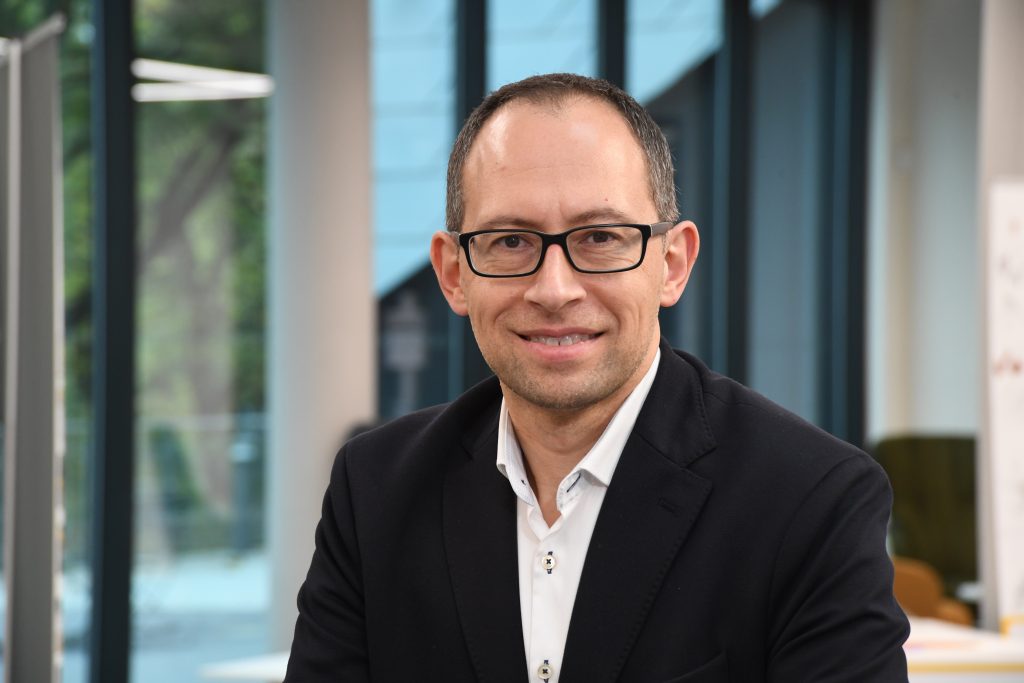Professor Richard Ambrosi appointed new Space Park Leicester Executive Director
Space Park Leicester is delighted to announce the appointment of Professor Richard Ambrosi as its new Executive Director.
Professor Ambrosi is an expert in space instrumentation and space nuclear power systems and will lead the development of the innovative research, enterprise and education cluster.
Richard first joined the University of Leicester in 2000, after completing a PhD in Physics at the University of the Witwatersrand in Johannesburg, South Africa. Since then he has lent his expertise to a number of international space missions, including the Swift Gamma Ray Burst Mission and ExoMars. Over the past decade, Richard has been leading the development of radioisotope power systems for the European Space Agency.
He has also previously chaired the UK Space Agency’s Space Exploration Advisory Committee and serves on a number of national and international committees.

“I feel honoured to be taking on the role of Space Park Leicester Executive Director. Having worked on the project from the beginning, it is very rewarding to have been part of the team that transformed an idea into the state-of-the-art facilities we see today.
“I am looking forward to the opportunity of realising the ambition of Space Park Leicester, which ranges from enabling discovery science, to changing the economics of access to space, to transforming how we use data to address global challenges and driving innovation through collaboration with our industry partners.
“The University of Leicester has an exceptionally talented team of people working in space research and together we can create new opportunities for Leicester, the UK and the next generation of space scientists and engineers”
Professor Richard Ambrosi
Developed by the University of Leicester in collaboration with local, national and international partners, Space Park Leicester comprises of a 9700 m2 facility featuring offices, shared laboratories, teaching facilities and co-working spaces, focusing primarily on research, development and applications of space.
The project enables collaboration between University researchers and the private sector, creating high quality knowledge-based jobs, building the skills base and contributing to economic growth and resilience of the economy. Space Park Leicester also proudly hosts the headquarters of the NERC-affiliated National Centre for Earth Observation (NCEO).
Professor Sarah Davies, Pro Vice-Chancellor and Head of the College of Science and Engineering at the University of Leicester, said: “Space Park Leicester is a landmark project, not only for our University and region, but for the UK space sector and for our collaborators across the globe. In Richard, we have appointed an Executive Director who matches our ambition to advance world-leading excellence in space research, inclusive education and training, and space-enabled industry as we look to consolidate Leicester’s role as a ‘space city’.
“We are hugely proud of our long-standing heritage in space research and exploration – expanding to the real-world impacts of space-based technology development and manufacture with downstream application of space-derived data, including tracking and combating climate change. With Richard at the head of a team of talented scientists, researchers and engineers, Space Park Leicester will play a key role in further developing the crucial links between industry and academia and supporting the skills pipeline required to expand the UK’s space ambitions.”
Space Park Leicester is delivered by the University of Leicester with a number of regional, national and international partners. Funders include the European Union (EU)’s European Regional Development Fund, Leicester and Leicestershire Enterprise Partnership (LLEP), Leicester City Council, The Wolfson Foundation, UK Research and Innovation (UKRI) and the Natural Environment Research Council (NERC).
Space Park Leicester also hosts the national headquarters of the NERC-funded National Centre of Earth Observation (NCEO).
Recently completed Phase 2, supported by a £13.75m grant from Research England, will provide state-of-the-art laboratories and workshops focused on advanced design and manufacturing of space systems, enabling technologies for space exploration, advancing the use of machine learning and automation in the space sector. Phase 2 also houses one of the largest university-based clean room facilities in the UK.
There are also plans for a further development on the Leicester site, with a commercial Low Cost Access to Space (LoCAS) payload and satellite manufacturing facility for the manufacture of mid-range satellites.
LoCAS will address the UK’s need for capacity to scale manufacturing of payloads and satellite constellations and will provide a pipeline for burgeoning UK launch services, lower the barriers to new entrants in the market and support the development of new business models for downstream services.


